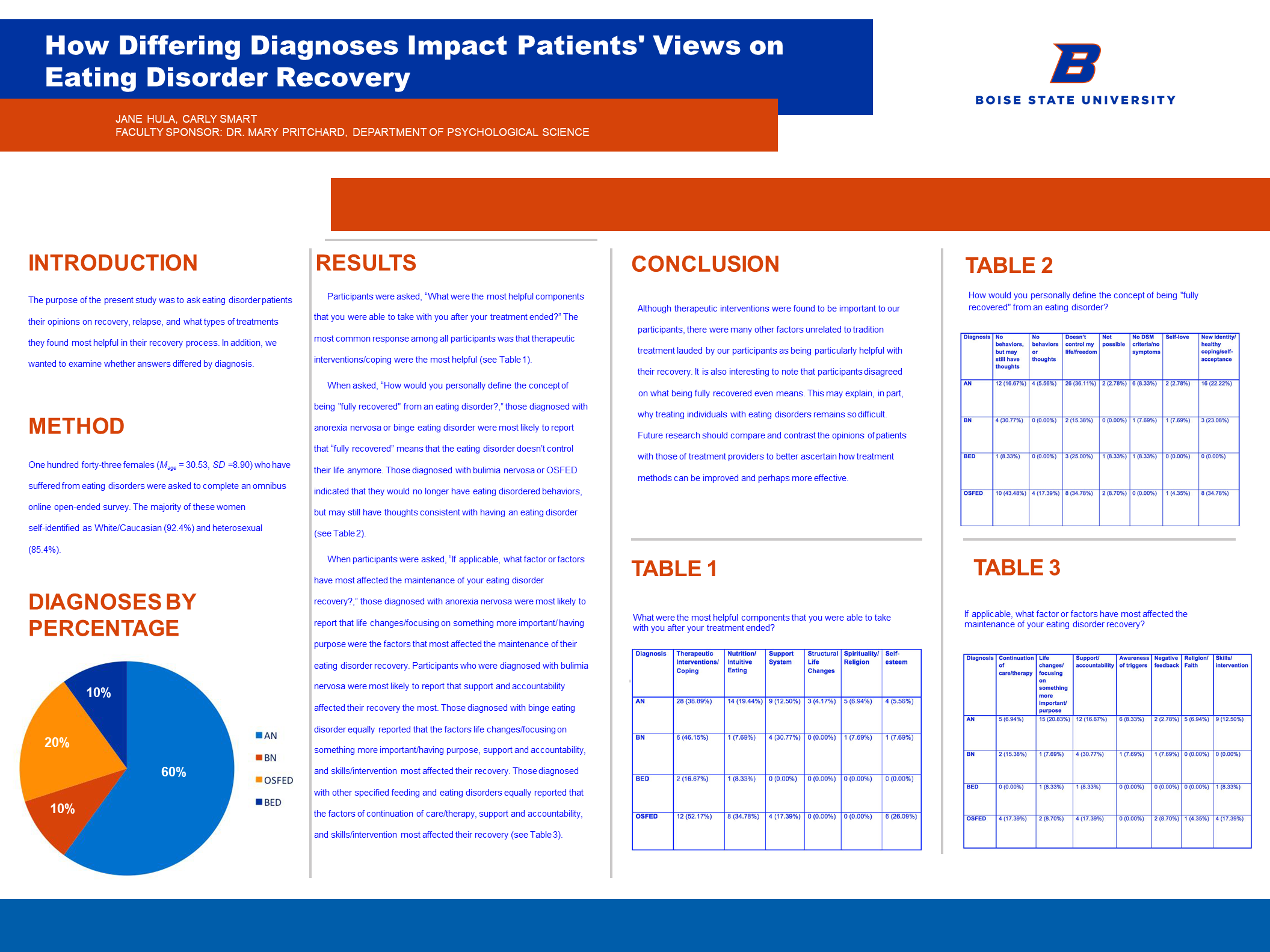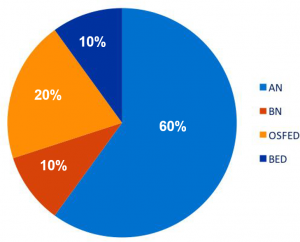Jane Hula, Carly Smart, Dr. Mary Pritchard

Introduction
The purpose of the present study was to ask eating disorder patients their opinions on recovery, relapse, and what types of treatments they found most helpful in their recovery process. In addition, we wanted to examine whether answers differed by diagnosis.
Method
One hundred forty-three females (Mage = 30.53, SD =8.90) who have suffered from eating disorders were asked to complete an omnibus online open-ended survey. The majority of these women self-identified as White/Caucasian (92.4%) and heterosexual (85.4%).
Diagnoses by Percentage

Results
Participants were asked, “What were the most helpful components that you were able to take with you after your treatment ended?” The most common response among all participants was that therapeutic interventions/coping were the most helpful (see Table 1).
When asked, “How would you personally define the concept of being “fully recovered” from an eating disorder?,” those diagnosed with anorexia nervosa or binge eating disorder were most likely to report that “fully recovered” means that the eating disorder doesn’t control their life anymore. Those diagnosed with bulimia nervosa or OSFED indicated that they would no longer have eating disordered behaviors, but may still have thoughts consistent with having an eating disorder (see Table 2).
When participants were asked, “If applicable, what factor or factors have most affected the maintenance of your eating disorder recovery?,” those diagnosed with anorexia nervosa were most likely to report that life changes/focusing on something more important/having purpose were the factors that most affected the maintenance of their eating disorder recovery. Participants who were diagnosed with bulimia nervosa were most likely to report that support and accountability affected their recovery the most. Those diagnosed with binge eating disorder equally reported that the factors life changes/focusing on something more important/having purpose, support and accountability, and skills/intervention most affected their recovery. Those diagnosed with other specified feeding and eating disorders equally reported that the factors of continuation of care/therapy, support and accountability, and skills/intervention most affected their recovery (see Table 3).
Table 1
What were the most helpful components that you were able to take with you after your treatment ended?
| Diagnosis | Therapeutic Intervetions/Coping | Nutrition/Intuitive Eating | Support System | Structural Life Changes | Spirituality/Religion | Self-Esteem |
|---|---|---|---|---|---|---|
| AN | 28 (38.99%) | 14 (19.44%) | 9 (12.50%) | 3 (4.17%) | 5 (6.94%) | 4 (5.56%) |
| BN | 6 (46.15%) | 1 (7.69%) | 4 (30.77%) | 0 (0.00%) | 1 (7.69%) | 1 (7.69%) |
| BED | 2 (16.67%) | 1 (8.33%) | 0 (0.00%) | 0 (0.00%) | 0 (0.00%) | 0 (0.00%) |
| OSFED | 12 (52.17%) | 8 (34.78%) | 4 (17.39%) | 0 (0.00%) | 0 (0.00%) | 6 (26.09%) |
Table 2
How would you personally define the concept of being “fully recovered” from an eating disorder?
| Diagnosis | No behaviors, but still may have thoughts | No behaviors or thoughts | Doesn't control my life/freedom | Not possible | No DSM criteria/no symptoms | Self-Love | New identity/healthy coping/self-acceptance |
|---|---|---|---|---|---|---|---|
| AN | 12 (16.67%) | 4 (5.56%) | 26 (36.11%) | 2 (2.78%) | 6 (8.33) | 2 (2.78%) | 16 (22.22%) |
| BN | 4 (30.77%) | 0 (0.00%) | 2 (15.38%) | 0 (0.00%) | 1 (7.69%) | 1 (7.69%) | 3 (23.08%) |
| BED | 1 (8.33%) | 0 (0.00%) | 3 (25.00%) | 1 (8.33%) | 1 (8.33%) | 0 (0.00%) | 0 (0.00%) |
| OSFED | 10 (43.48%) | 4 (17.39%) | 8 (34.78%) | 2 (8.70%) | 0 (0.00%) | 1 (4.35%) | 8 (34.78%) |
Table 3
If applicable, what factor or factors have most affected the maintenance of your eating disorder recovery?
| Diagnosis | Continuation of care/therapy | Life changes/focusing on something more important/purpose | Support/accountability | Awareness of Triggers | Negative feedbackNo DSM criteria/no symptoms | Relition/Faith | Skills/intervention |
|---|---|---|---|---|---|---|---|
| AN | 5 (6.94%) | 15 (20.83%) | 12 (16.67%) | 6 (8.33%) | 2 (2.78%) | 5 (6.94%) | 9 (12.50%) |
| BN | 2 (15.38%) | 1 (7.69%) | 4 (30.77%) | 1 (7.69%) | 1 (7.69%) | 0 (0.00%) | 0 (0.00%) |
| BED | 0 (0.00%) | 1 (8.33%) | 1 (8.33%) | 0 (0.00%) | 0 (0.00%) | 0 (0.00%) | 1 (8.33%) |
| OSFED | 4 (17.39%) | 2 (8.70%) | 4 (1739%) | 0 (0.00%) | 2 (8.70%) | 1 (4.35%) | 4 (17.39%) |
Conclusion
Although therapeutic interventions were found to be important to our participants, there were many other factors unrelated to tradition treatment lauded by our participants as being particularly helpful with their recovery. It is also interesting to note that participants disagreed on what being fully recovered even means. This may explain, in part, why treating individuals with eating disorders remains so difficult. Future research should compare and contrast the opinions of patients with those of treatment providers to better ascertain how treatment methods can be improved and perhaps more effective.
Additional Information
For questions or comments about this research, contact Jane Hula at janehula@u.boisestate.edu.